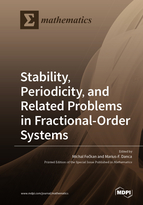Stability, Periodicity, and Related Problems in Fractional-Order Systems
A special issue of Mathematics (ISSN 2227-7390). This special issue belongs to the section "Engineering Mathematics".
Deadline for manuscript submissions: closed (15 April 2022) | Viewed by 10821
Special Issue Editors
Interests: dynamical systems; fractional systems; functional analysis
Special Issues, Collections and Topics in MDPI journals
Interests: nonlinear dynamics; continuous/non-smooth chaotic; dynamical systems of integer/fractional order; chaotic hidden attractors; fractals
Special Issues, Collections and Topics in MDPI journals
Special Issue Information
Dear Colleagues,
Since the seminal work of Fourier on periodic functions, periodicity has played a central role not only in mathematics but also in natural sciences such as physics, chemistry, and biology that deal with matter, energy, and their interrelations and transformations. Nonlinear phenomena, by contrast, are difficult to describe by mathematical analysis based on smoothness, and thus, fractional calculus has been used to model many such processes for which the standard integer-order derivatives do not work adequately. While it is well known that the classical derivative of a periodic function is a periodic function with the same period, things are different with respect to derivatives of fractional order, where the periodicity property is not maintained by the fractional derivative of periodic functions. In addition to the theoretical importance of the first result of Tavazoei on the non-periodicity of non-constant solutions of autonomous fractional-order equations, its implication on numerical analysis of autonomous fractional-order systems has become more and more serious. Moreover, since then, several works on other aspects of periodicity of fractional-order systems, such as asymptotical periodicity, has appeared as complementary to or a remedy of the unpleasant non-periodicity of fractional order systems. Similar aspects of periodicity in discrete-time systems of fractional order have also been developed. As a consequence, all reported results based on the “periodicity” of fractional-order continuous- or discrete-time autonomous systems have become questionable. A numerical approach to fractional-order systems may be carried out using several reliable numerical schemes especially designed for such systems.
This Special Issue aims to collect new perspectives on the trends in both theory and applications of stability, (non)periodicity of fractional order continuous and discrete systems, analytical and numerical approaches, and any related problems regarding (but not limited to) time-delayed systems and impulsive systems in all fields of science, as well as engineering mand multidisciplinary applications.
Prof. Dr. Michal Fečkan
Prof. Dr. Marius-F. Danca
Guest Editors
Manuscript Submission Information
Manuscripts should be submitted online at www.mdpi.com by registering and logging in to this website. Once you are registered, click here to go to the submission form. Manuscripts can be submitted until the deadline. All submissions that pass pre-check are peer-reviewed. Accepted papers will be published continuously in the journal (as soon as accepted) and will be listed together on the special issue website. Research articles, review articles as well as short communications are invited. For planned papers, a title and short abstract (about 100 words) can be sent to the Editorial Office for announcement on this website.
Submitted manuscripts should not have been published previously, nor be under consideration for publication elsewhere (except conference proceedings papers). All manuscripts are thoroughly refereed through a single-blind peer-review process. A guide for authors and other relevant information for submission of manuscripts is available on the Instructions for Authors page. Mathematics is an international peer-reviewed open access semimonthly journal published by MDPI.
Please visit the Instructions for Authors page before submitting a manuscript. The Article Processing Charge (APC) for publication in this open access journal is 2600 CHF (Swiss Francs). Submitted papers should be well formatted and use good English. Authors may use MDPI's English editing service prior to publication or during author revisions.
Keywords
- Fractional-order system
- Stability
- Periodic solution
- Fractional calculus







